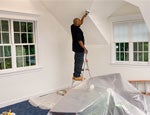From Investopedia.com
Scam artists are nothing new, but there are plenty of reasons to predict there will even more of them due to tough economic times. While they tend to prey on the elderly, anyone who is not cautious and informed is a potential victim. Your best defense is a skeptical mind and knowing what to look out for when you hear that offer that’s “too good to refuse.” Here are some of the most popular, and costly, home improvement scams.
1. One-Time Special
It’s a very rare business that’s had only one sale in its entire history. The reality is that most businesses hold sales throughout the year, and that’s not likely to change anytime soon.
If a contractor approaches you with a special offer, ask for concrete evidence that the quoted price is lower than what they have charged in the past for the same work. This could include a past catalog, special mailing, a dated price list or evidence of identical work for a past customer.
Don’t be pressured into accepting a deal that will expire before you’ve had a chance to do research, get competing bids and check references.
2. I Might As Well
Be wary of the contractor who knocks on your door and says he’s working just down the street. He tells you he noticed a few things that need some work on your house and that you could save money by hiring him on the spot. Coincidentally, he just happens to have all the materials and tools to start right away.
This approach is often used to entice you into doing things that are visible from the outside like roof repair, painting, window caulking, deck restoration, driveway coating and chimney repair. If the contractor claims to have all the materials, ask him where they came from and who paid for them. If they are left over from an earlier job, there’s some chance that the previous homeowner footed the bill.
3. Cash before Work
Nothing should set off more alarm bells than the contractor who wants to be paid in full for a project before it’s started. This arrangement sets you up for a disappearing contractor who never starts the work.
A reasonable down payment is expected to cover startup labor costs and materials. Normally, this should not exceed one-third of the total contract value and it’s wise to make it as small as possible. The balance of the money can be tied to completion milestones to keep the contractor motivated to stay on schedule. Hold a sizable portion of the money until the project is finished, and make final payment dependent on your personal inspection and satisfaction.
4. Financing Offers
Another warning flag is the offer to arrange financing to pay for your renovation, sometimes from a lender that the contractor knows personally. The offer may include a special interest rate for a limited time only. What won’t be disclosed is that the contractor may be getting kickbacks or other favors from the lender.
If you don’t review the loan papers carefully, you may later find out that you’ve signed up for a refinancing or high-interest home equity loan, or unknowingly transferred your deed. If the money goes to the contractor, there’s no incentive to complete the work. Always shop around for the best loan available, and consult an attorney if you need help understanding the terms and conditions.
5. Fly-By-Night Contractor
Be extremely wary if a contractor pulls into your driveway in an unmarked truck. If you talk to him, do it outside in public view. Anyone that enters your home is a potential burglar, or worse. If the truck has out-of-state plates, don’t even waste your time.
For all contractors, you should apply due diligence. Verify their name, business name and license number, address and telephone number. Ask for their insurance papers, and verify that they are bonded in accordance with applicable laws.
6. Model Home
Beware of the contractor who wants to fix up your home so he can show it off to other potential customers. In exchange for your agreement to the proposed work, you will likely be tempted with a deal that seems too good to pass up.
Chances are pretty good that some or all of the work he’s recommending doesn’t really need to be done. Reputable contractors don’t need models to showcase their work and if they needed one, they wouldn’t use an occupied home for that purpose.
The Bottom Line
Use resources such as the Better Business Bureau, Department of Consumer Protection, and the local license board to check the contractor’s business reputation and credentials. A history of consumer complaints, lawsuits and expired licenses are all reasons to keep looking for a reliable contractor.
Common sense and good judgment offer the best protection from home renovation scams. If it seems too good to be true, it probably is. It’s always wise to get multiple estimates before starting any project and if there are wide differences in the quotes, try to figure out why. Most importantly, don’t sign any contract that you don’t understand completely.




